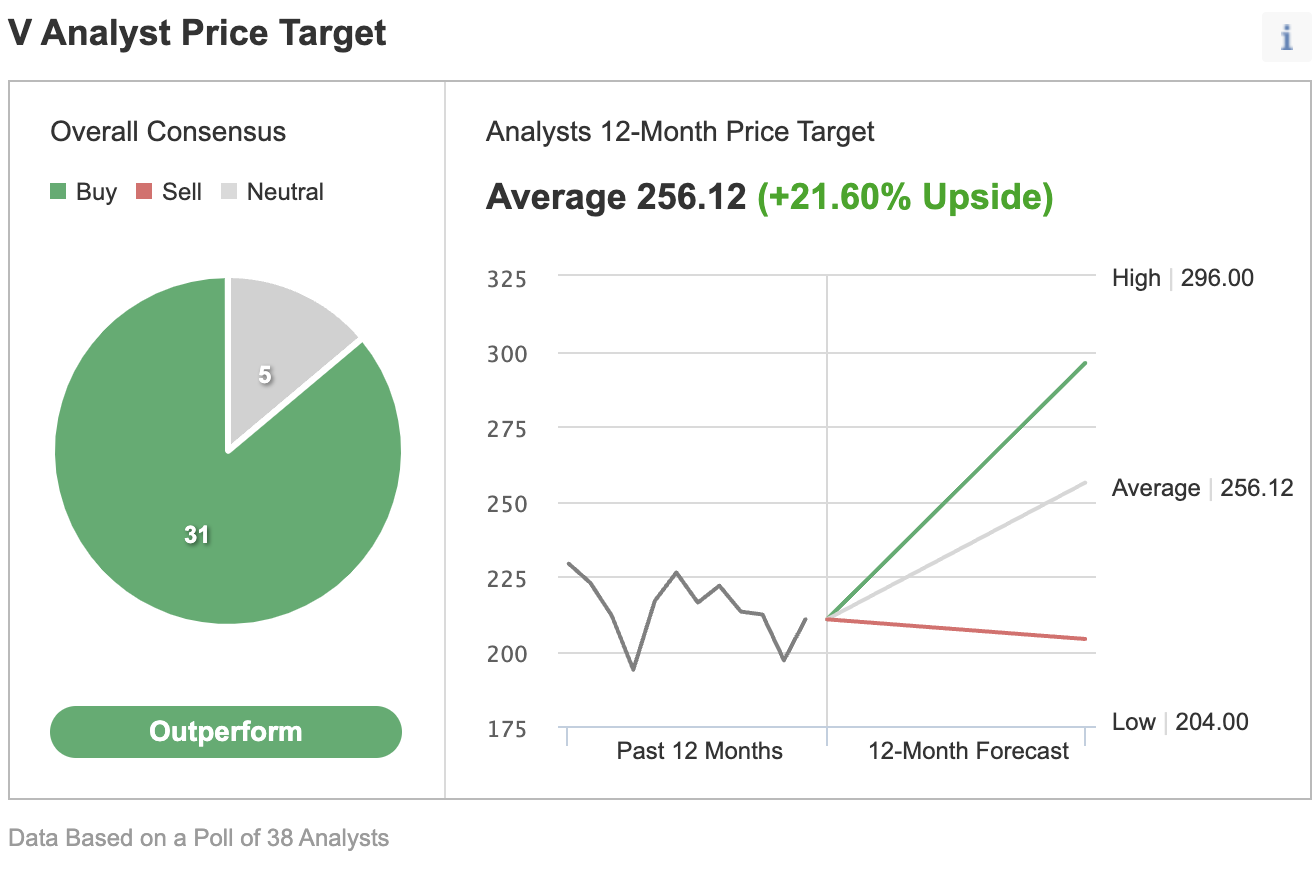- Visa stock is under pressure on concerns that a looming recession will hurt spending
- Visa’s latest earnings show cross-border transactions are recovering strongly
- Visa has delivered 20% per year dividend growth over the past five years
Shares of Visa Inc (NYSE:V) have been under significant pressure since hitting a record high in the past summer, as investors dumped the payment processing giant on fears that the looming recession would continue to hurt consumer spending.
Visa stock is down more than 16% during the past year after staging a sharp recovery from the pandemic-triggered slump. The company’s latest earnings report provided some encouraging signs for investors with a long-term horizon.
Quarterly sales on the Visa network jumped 8% to $2.93 trillion in the fiscal third quarter ending June 30, fueled by a 28% increase in overseas spending on the firm’s cards. Customers outside the US account for more than 50% of Visa’s revenue. This pent-up demand for travel has resulted in cross-border spending volume surpassing 2019 levels for the first time since the pandemic began in early 2020.
These favorable numbers have so far failed to fuel a rally in the company’s shares. One obvious reason making investors cautious is the risk of a recession and four-decade high inflation—two factors that could hurt consumer spending.
The GDP report showed today that the US economy shrank for a second quarter amid surging prices and the Federal Reserve interest-rate hikes, further stoking fears of a downturn.
Regulatory Threats
Various regulatory moves also threaten Visa’s growth outlook. Media outlets reported yesterday that U.S. senators plan to introduce legislation as early as this week to allow merchants to route Visa and Mastercard (NYSE:MA) credit card transactions over alternative networks.
The legislation, introduced by Democratic Richard Durbin of Illinois and Republican Roger Marshall of Kansas, aims at enforcing that banks with more than $100 billion in assets provide a choice of at least two credit-card networks to process electronic transactions. In addition to this new proposed legislation, the US Department of Justice (DoJ) is investigating Visa over allegations that it limited the ability of merchants to route debit card transactions to limit so-called “network fees.”
The Wall Street Journal has also reported that the DoJ expanded its antitrust probe by looking into Visa’s relationship with fintech companies, specifically the kinds of incentive payments it had offered Block (NYSE:SQ) and PayPal Holdings (NASDAQ:PYPL).
These probes show that shares of payment giants face uncertainty and could remain under pressure as long as there is some clarity on these initiatives.
Nonetheless, according to some analysts, that weakness is a buying opportunity. Of 38 analysts polled by Investing.com, 31 have an “outperform” rating on the stock, with their consensus price target showing a 22% upside from the current price.

Source: Investing.com
While reiterating Visa as one of its top ideas, Morgan Stanley said the payment giant should continue to benefit from the ongoing recovery in travel.
The bank’s recent note said that Visa could benefit from the reopening of the Asia-Pacific travel market with room for more European tourism improvement. At the same time, the perception of inflation risk may be overdone, especially for higher-income groups.
Goldman Sachs, in a similar note, said investors are not valuing Visa and Mastercard as they should. The investment bank added that both companies would benefit from the “electrification of consumer spending” and are among the best defensive names to weather inflation:
“We are most constructive on V/MA, as we believe these businesses are underearning given cross-border revenues are on recovery trajectories but still depressed, which along with higher inflation should provide an idiosyncratic growth impulse and a partial offset to any macro weakness.”
Another reason for owning Visa stock is its robust dividend growth. Visa has raised its annual payout for 13 straight years and has a lot of cash to continue making hikes comfortably. Just in the past five years, Visa’s dividend per share growth, on average, has been close to 20% each year. Over the past five years, the stock returned 112% in total returns, more than double what S&P 500 delivered.
Bottom Line
Visa stock has been under pressure recently for a variety of reasons. But we believe these headwinds are temporary and offer a buying opportunity in a stock with an impressive track record for growth and income.
Disclaimer: The writer doesn’t own shares of Visa.
